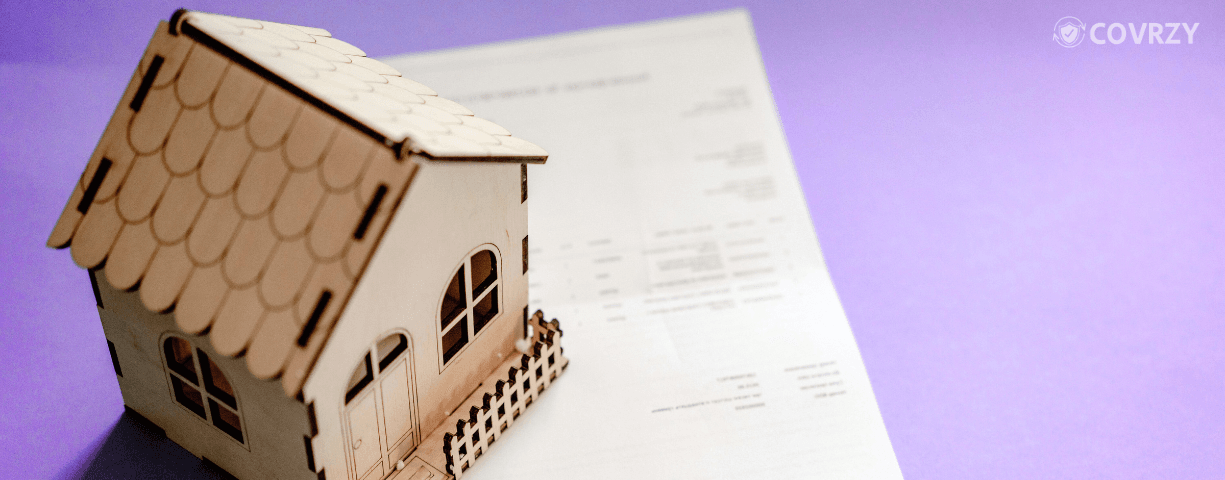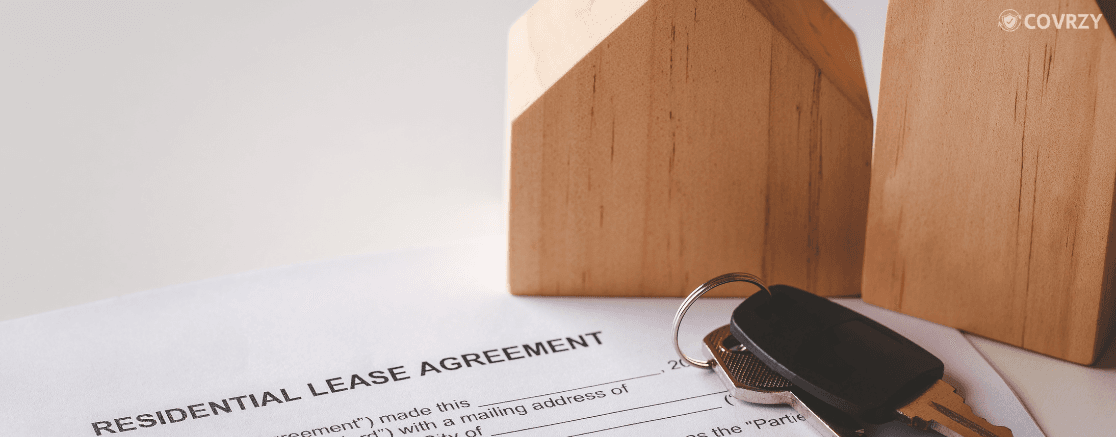What Is House Rent Allowance Under Section 10(13A)?
Sourav Banik
Author

Maybe your first job made you travel to a different city, or stay in a completely different place because of the nature of the work. This is the situation with almost every employee, as a research study finds out. Many employees migrate to different states for employment opportunities, searching for a new prospect and a better possibility for a stable future. While many of them stay in rented apartments or pay guest accommodations, companies pay a proportion of the rent expenses. This is what we see as HRA (House Rent Allowance) in the salary slip. Let’s understand the components of house rent allowance under Section 10(13A) and how you can submit tax exemption on it.

Know the top advantages of property insurance in India.
What is HRA?
House Rent Allowance meaning is a specific form of allocation that a company provides to cover rental expenses. While there is no specific mandated rule that dictates companies to provide HRA, many companies offer HRA as a part of their salary. While HRA is not fully exempted from tax, you can still claim exemption on HRA exemption under new tax regime. You have to note your basic salary as well as the Dearness Allowance (DA) percentage your company provides. The reason is that HRA is calculated based on the DA and basic salary, so take note of your basic remuneration and DA amount. The reason companies offer HRA is to provide flexibility and improve employee lifestyle.
Let’s talk through this with an example.
HRA Example
Kritika’s monthly rental expenses are approximately around ₹25,000 in a Tier-1 metro city. Her other living costs include food consumption costs, travel expenses, and various miscellaneous costs. The salary Kritika withdraws per month, compensates only for her living expenses, leaving her without any savings. To adjust her monthly savings and make her financially flexible, her company provides an HRA benefit included in her annual CTC. With HRA, employees can easily have better financial autonomy by covering their monthly rentals.
Who is Eligible For HRA?
A portion of house rent allowance is exempt from tax, but there are certain criteria to follow to claim the exemption benefits.
- Firstly, you have to be a full-time salaried individual and not a part-time employee. Usually, part-time individuals or interns are not allowed the facility of HRA
- Secondly, you cannot claim complete tax benefits under Section 10(13A) of the Income Tax Act if you are not living in a rented place. Your rental amount also determines the exact amount of tax benefits you can claim
- Thirdly, HRA should be a part of your CTC. HRA is not a separate payment allowed apart from your salary, so anything such as a bonus or incentives doesn’t count
- And lastly, You must have rent receipts to be eligible for house rent allowance under section 10(13A). In case you are not living in a formal rental agreement, you may not be eligible to receive HRA benefits
Your office building and office assets are always under the threat of fire damage or vandalism. Imagine your property being catastrophically damaged and your business suffering a loss of crores, which is never easy to recover. This is why having the right property insurance is a necessity. Explore Covrzy’s comprehensive property insurance that is structured for covering your business premises, even in the most challenging times. Whether you're deciding to rebuild your office or thinking of relocating to a temporary office space, our coverage is built to support your business in every step.
HRA for the Self-Employed
For self-employed people, HRA cannot be claimed. The main reason for this rule is that HRA is allowed for only salaried employees representing an organization. Self-employed people such as freelancers and shop owners cannot claim HRA as part of their remuneration from their customers, as they do not withdraw a monthly salary. The first eligibility for receiving HRA benefits is that it has to be included in the annual CTC of an employee. Self-employed entrepreneurs, content creators, freelancers as well as interns do not qualify for receiving the benefits of HRA, hence self-employed individuals cannot claim it.
HRA for Corporate Employees

For corporate employees, HRA is a significant component of their salary bracket. If you are a salaried employee, you must know that you qualify to receive the benefits of HRA exemption for salaried employees. Section 10(13A) of the Income Tax Act, 2013 allows a salaried employee to receive all benefits of HRA monthly and be eligible for getting the tax benefits too. However, depending on your workplace location and your actual rental location, HRA will be determined.
Calculation of HRA for Corporate Employees
HRA is calculated based on the lowest of any of these four factors:
- Your actual HRA amount received from your company
- 50% of your basic salary including DA benefits for employees living in metro cities
- 40% of your basic salary including DA benefits for employees living in non-metro cities
- 10% of your basic salary including DA benefits deducted from the actual monthly rent paid Whichever amount is lowest out of these above four options, will be your HRA for an annual financial period. You need to calculate the house rent allowance under Section 10(13A) limit based on your location and the monthly rent you pay.
Example for Corporate Employees
Rishi is a full-time employee, working as a senior graphic designer in a Bangalore-based company for the last 2 years. He has taken up accommodation in the hinterland of Bangalore, which costs him around a rent of ₹20,000 monthly. His basic salary is ₹38,000, with a Dearness Allowance of ₹2,000 monthly. Here is Rishi’s annual salary and expenses:
| Particulars | Amount (p.a) |
|---|---|
| House rent | ₹2,40,000 |
| Salary (including DA) | ₹4,80,000 |
| HRA | ₹1,50,000 |
Let’s now compare which amount is the lowest of all.
- HRA received by company: ₹1,50,000
- 50% of basic salary (including DA): 50% of ₹4,80,000 = ₹2,40,000
- Basic salary (including DA) - 10% of actual rent: ₹4,56,000 As you can see, among all these above three amounts, the HRA received by Rishi is the lowest one — ₹1,50,000. Hence only this amount is eligible for HRA exemption under new tax regime.
Also read about corporate tax, its current rate and how to pay in India.
HRA for Government Employees
For government employees, the house rent allowance calculation is a bit different as compared to private employees. But first, let us review the major eligibility criteria to claim HRA for all government employees.
Eligibility For HRA for Government Employees
As for government employees, HRA eligibility criteria is different. House rent allowance is paid based on these conditions:
- The salaried employee is living in the quarter or residence allotted by the Central government
- Any government employee who has been transferred but still reserves the right of their previous government accommodation, will be entitled to HRA for 8 months from his transfer date
- If a government employee leaves their previous accommodation for being transferred and has not received any new accommodation or rented a new place for their family, then they are eligible for a six-month DA from the date of their transfer
- HRA rates will vary after 3 months from the date of transfer of a government employee. Till 3 months expire, the government employee will be withdrawing HRA at a fixed rate which was prevailing before their transfer
- Government servants cannot claim HRA if they share their accommodation with another government employee
- All government employees who are residing in rental houses which have been granted as accommodation facilities to their parents or children or spouse are not eligible for receiving any HRA benefits
- A government employee also cannot claim any form of HRA if their spouse has been staying in the same station where they have been granted government accommodation
- A government employee whose spouse or children has been sharing government accommodation with another government employee, will not be eligible to receive HRA. Such an employee can choose which family member can receive HRA
- If a husband and wife both are working as government employees, both would be eligible to receive HRA benefits if they are living in a hired or owned place The tax benefits are, however, different for different cities. For example, if you are staying in a city where the total population is more than 50 lakhs, then you will be entitled to receive a house rent allowance under Section 10(13A) limit of 24%. The rates are all revised according to the 7th Pay Commission guidelines. The central government has classified the locations according to their population base and their general income level. The cities are:
| Cities | Population level | HRA Rate |
|---|---|---|
| X | More than or equal to 50 lakhs | 27% |
| Y | 5 - 50 lakhs | 18% |
| Z | Less than 5 lakhs | 9% |
Here the cities termed as X, Y, and Z are usually denoted by Tier-I, Tier-II, and Tier-III cities. For example, cities such as Bangalore, Delhi, Chennai, and Kolkata are denoted by City X, while City Y denotes cities such as Guwahati, Patna, Rajkot, Gurgaon, Bhopal, and a few more cities.
Government employees can apply for HRA exemption under the new tax regime, given that they are standing by all the major conditions for being eligible. Factors such as the location, the sharing of accommodation with their family, and transfer matters while deciding the amount of HRA.
Tax Exemption of House Rent Allowance Under Section 10(13A)
Under Section 10(13A), house rent allowance is exempt from tax payment annually. But the thing to note is that for all corporate employees employed in the private sector, payment of HRA will be subjected to only the old tax regime. As the Income Tax Department had introduced a new tax regime for 2024-25, the income tax exemption limit had been increased to ₹3 lakhs. If you are choosing the income tax threshold, then you will not be eligible for HRA tax exemption benefits. Here is a simple explanation of this:
- Apply for tax exemption on HRA benefits without income tax exemption
- Apply for direct income tax exemption instead of HRA tax exemption If an employee chooses the new tax base, they will not have to pay for TDS if their income ranks under ₹3 lakhs. In such a case, the employee cannot claim a HRA tax deduction.
Check all the steps to pay TDS online.
Documents For Claiming HRA Tax Exemption

You will be required to submit these documents:
- PAN Card details of your landlord if your annual rent exceeds ₹1,00,000
- Rent receipts that have the stamp of your municipal corporation
- Written rent agreement with our landlord
- Rental address along with your PAN Card details
- A duly filled Form 12BB This form aids individual employees in claiming their HRA tax in a given fiscal year. The main purpose of Form 12BB is to allow employees to understand their tax implications and also check their in-hand salary after their annual CTC. Also, the reason for claiming the PAN Card details of the landlord is to have clarity on the income level and tax payment status of the landlord. This is extremely important as unless your landlord pays tax, you cannot HRA benefits as the rental turns out to be unethical. In case the landlord does not possess a PAN Card, they may submit a written declaration receipt of the rent. Thus HRA exemption without rent receipts is not possible.
How To Claim HRA Living With Parents?
It may be a bit confusing if you can claim tax exemption on HRA if you are living with your parents. If your parents own the property, you can claim HRA taxation benefits. In this case, you will deposit the approximate house rent to any of your parents which will be started as a monthly rent. For this, you may have to enter a rental agreement with your parents to be eligible to claim tax benefits. Moreover, if your family income is below the threshold of ₹3 lakhs, you can also claim tax benefits apart from saving tax deductions on HRA.
Conclusion
HRA is a part of the CTC for all corporate employees provided by the company as a means to adjust the living expenses of their employees. Living in metro cities such as Hyderabad, Chennai, Delhi, and others is intensive, and as a means to improve the financial autonomy of employees, companies include HRA within the CTC. However, HRA is exempted from tax if you claim it under Section 10(13A) of the Income Tax Act. Claiming tax benefits is easier when you follow the steps outlined in the blog, as you have to submit rent receipts and PAN card details of your landlord for claiming tax exemption. Note that the house rent allowance under Section 10(13A) limit extends till your annual income does not cross the threshold of ₹3 lakhs, as per the new tax regime.
Frequently Asked Questions
Explore moreHow to claim the benefits of income tax under house rent allowance?
You can claim income tax benefits only if your income does not exceed the maximum limit of ₹3 lakhs. In case you are claiming income tax benefits, you should note that HRA tax exemption is not applicable for such cases unless you are serving as a government employee.
How much of the HRA tax exemption can I claim without any proof?
Without any rental proof or proof of your residence, you cannot claim HRA tax exemption. Details such as PAN Card details and rental agreement signed by your landlord are mandatory details to be supplied for claiming tax benefits.
How much rental income is free of tax?
Your rental income is applicable for tax benefits in case you are the landlord, and your age has exceeded 60 years. Being a senior citizen, you can claim tax benefits unless your rental income does not exceed ₹3 lakhs per annum.
Is HRA part of the 80C Form?
Your house rent allowance is exempt from tax under Section 10(13A), and not Section 80C. Section 80C rather is a financial instrument that allows you exemption from tax for investing in certain assets such as Public Provident Funds or National Savings Certificates.
Can I claim a home loan and HRA tax deductions at the same time?
If you are claiming a home loan as well as HRA at the same time, then make sure that you have taken a home loan in your name or the name of your spouse, as well as you are residing till then in a rented place. Home loan deductions can be availed under Section 80C, while Section 10(13A) of Income Tax Act allows for HRA deductions.
Do you have more questions?
Contact us for any queries related to business insurance, coverages, plans and policies. Our insurance experts will assist you.
